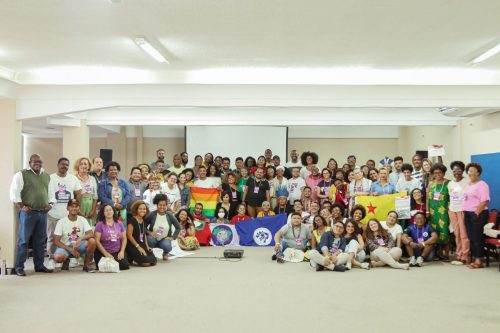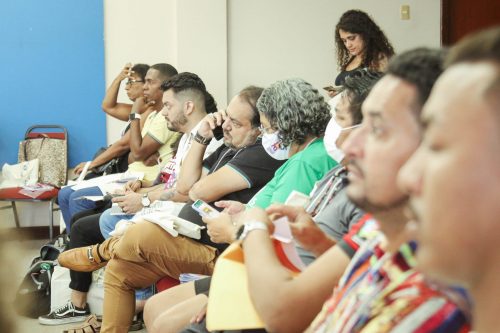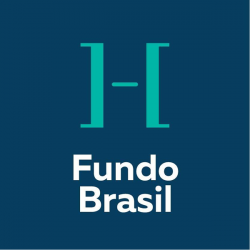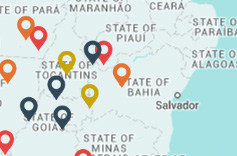
Over 60 organizations, groups, and collectives, supported by the call for applications of Brazil Fund, meet in Salvador
Every year, Joyce Rodrigues repeats the same exercise with her students in the socio-political studies class. When they talk about the independence of Brazil, Joyce asks the teenagers to write a letter to the newly founded country. “There’s a dose of naivety and wishful thinking about the future,” she says. “There is also the impression that Brazil’s independence would guarantee certain achievements. As if there were no more conflicts installed,” she says. She reminds us that two hundred years ago in Brazil, different groups were competing over the country’s future as of that moment.
Joyce brought up this experience during the Brazil Fund Meeting of Projects opening. For three days, at the Foundation’s invitation, 66 human rights organizations from the north and northeast of the country gathered in Salvador to debate the paths that Brazilian democracy can take. And to ponder the role of organized civil society in the struggle to build this future. “We have other battles to fight today. In recent years, democratic institutions and instruments of popular participation have been damaged,” said the teacher. “It is necessary to think about the country’s chronic problems if we want to think about the current ones.”
The Meeting of Projects is a traditional event of the Brazil Fund. Every year, the institution invites current grants selected in a call for proposals to meet and exchange experiences and impressions. In 2022 the meeting was divided into two stages after two years in a virtual format. The first took place at the end of August and brought together organizations from the South, Southeast, and Midwest regions of São Paulo. The second happened between September 14 and 16 in the capital of Bahia. “These meetings are of great importance to the Brazil Fund,” said Allyne Andrade e Silva, deputy executive director of Brazil Fund, during the event in Salvador. “We are an institution that bases its actions on the act of listening. Listening to the organizations that work daily in defense of human rights”.
Present in the meeting were the groups granted in the calls 2021-Moving Forward with Rights; Human rights and criminal justice; Tackling Racism at the Grassroots Level; LGBTQIA+ defending rights; Human rights defenders: strengthening safeguarding skills for protection and integral safety; In defense of the rights of indigenous peoples; Mobilisation in Defence of Civic Spaces and Democracy; and in the SOS Amazônia emergency support.
Joyce and Cláudia Balthazar mediated the debates. It was up to them to kick-start the discussion on the current Brazilian democracy. Those present agreed that this is a flawed one and in need of expansion. “We need to build a democratic republic for all of us. A republic like Palmares”, said Augusto de Carvalho Souza, from the Metropolitan Association of Secondary Students of Salvador (Ames Salvador). “We must organize our people to build a new society.”
Many ways to defend democracy

The meeting was marked by debates on the future of democracy
Besides the debates, the Meeting of Projects provides many moments for the articulation between the organizations that act on different agendas: from the fight for land waged by peasant women to the fight against Racism undertaken by terreiro peoples. Groups that, in different ways, work to expand democratic achievements.
It is the case of Afirmativa magazine, a black media collective from Salvador that uses journalism as an instrument to acquire rights. “Our anti-racist fight is through communication,” explains editor Jonas Pinheiro. “We fall short in terms of democracy in Brazil because there is a lack of plurality in spaces of power. Therefore, it is necessary to qualify the debate and communicate from the perspective of the peoples who have been marginalized”, he defends. Afirmativa magazine was supported by Brazil Fund in the Tackling Racism at the Grassroots Level call for proposals. The call warded 21 groups with institutional support – the kind that does not need linking to a specific project and with resources that can be used to strengthen the organization. “Communicating is expensive, and having support like Brazil Fund’s is fundamental to guarantee the magazine’s existence,” he says.
The same is the case of the National Forum for Black Transvestites and Transsexuals (Fonatrans). Since 2014, the group has combined discussions on gender identity with racial issues. And pressures the public authorities to develop policies capable of guaranteeing dignity to the black trans population. “The public policies we have today still take white and cisgender bodies as references. We need to move forward, make other experiences visible”, says Jéssika Rodrigues, an activist at the organization. “Support such as that of the Fund allows us to reach new spaces.”
In Vale do Javari, Amazonas, the fight for democracy is intertwined with defending indigenous territories. Threatened by the advance of loggers, illegal fishermen, and miners, the Vale do Javari Indigenous Territory is experiencing an escalation of violence. To oppose this scenario, the Union of Indigenous Peoples of Javari (Univaja) articulates monitoring and reporting actions. “Univaja fulfills a role that should belong to the State. We protect the indigenous territory of the Javari Valley”, says Paulo Marubo, coordinator of the organization. “Defending this territory has caused us to receive death threats. We need support to protect those who protect the forest”.
The meeting was also a breath of fresh air amid our busy daily life for the ones there. A moment to catch their breath. “The challenges are many, and fear tries to weaken us,” said Cláudia Balthazar. “But what makes us stronger is knowing that our people are still here, with us.”







